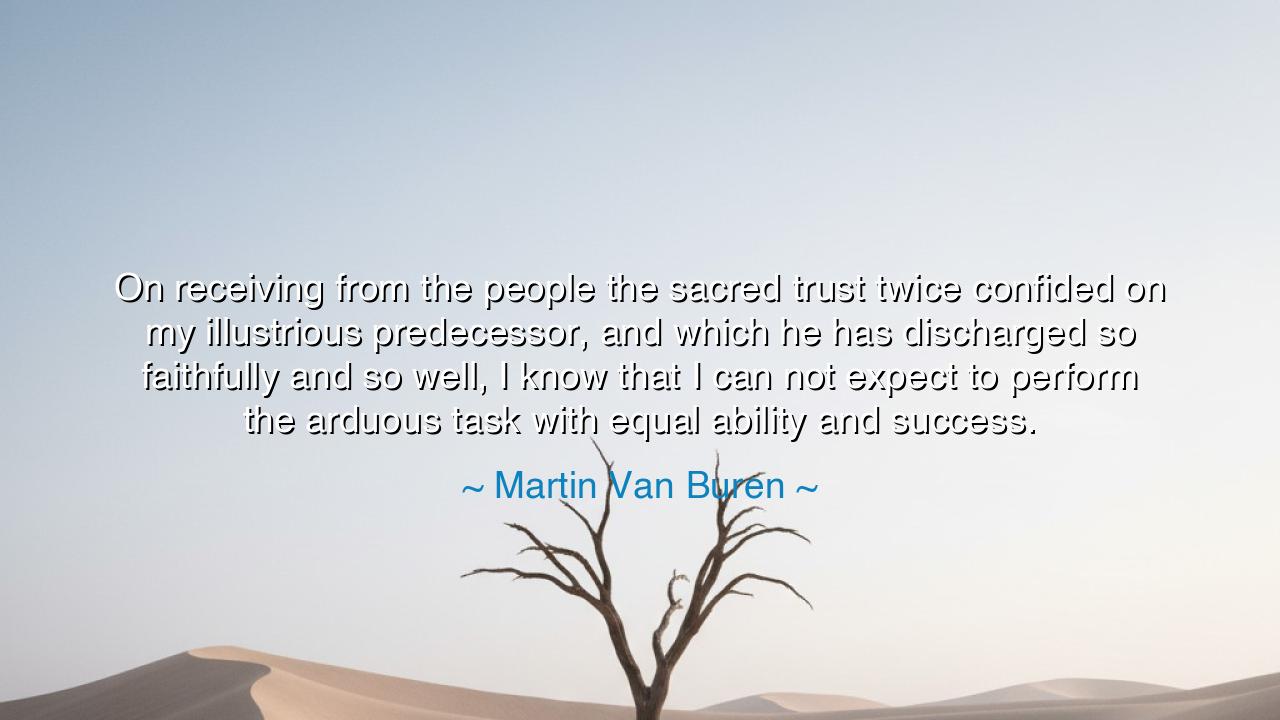
On receiving from the people the sacred trust twice confided on
On receiving from the people the sacred trust twice confided on my illustrious predecessor, and which he has discharged so faithfully and so well, I know that I can not expect to perform the arduous task with equal ability and success.






“On receiving from the people the sacred trust twice confided on my illustrious predecessor, and which he has discharged so faithfully and so well, I know that I can not expect to perform the arduous task with equal ability and success.” Thus spoke Martin Van Buren at his inauguration in 1837, as he stepped into the office left by Andrew Jackson. These words, clothed in humility, reveal a truth that echoes across the ages: that leadership is not merely power, but a sacred trust, given by the people, and burdened with weighty responsibility.
The ancients themselves knew this truth. Kings and chieftains were not rulers by whim but stewards of the people’s well-being, chosen to guard justice, prosperity, and peace. The Romans called this the fides publica—the public trust—without which no government could endure. To betray that trust was to strike at the very heart of the state. Van Buren, in acknowledging the greatness of his predecessor, reminded his people that leadership is not a crown of glory, but a duty before both history and heaven.
His words also speak of humility, that rare virtue in rulers. He did not stride forward boasting of his own brilliance but bowed before the example of Jackson, whose fierce will and popular appeal had shaped a new age of democracy. Van Buren knew that to carry on the mantle of such a figure was an “arduous task,” and by confessing his limits, he won the respect of those who saw in him not arrogance, but honesty. The greatest leaders of history have always spoken thus—not exalting themselves, but exalting the trust that was given into their hands.
Consider the example of Marcus Aurelius, the philosopher-emperor of Rome. When he received the purple, he did not revel in it, but wrote in his Meditations that he must remember daily the heavy burden of ruling justly. He compared his duty not to a prize, but to a soldier’s post—something to be endured with discipline for the good of others. Like Van Buren, he saw that true honor lies not in boasting of greatness, but in confessing the gravity of the task entrusted to him.
Van Buren also reminds us that no man rules in isolation. His reverence for his predecessor speaks to the continuity of leadership, the passing of the torch through generations. Each leader builds upon the foundations laid by those before him, and each must hand the structure onward, strengthened or weakened by his own stewardship. The sacred trust is not his possession, but the inheritance of the people, guarded for a season before being passed again.
The lesson for us is clear: in our own lives, whether we lead a nation, a household, or a small circle of friends, we must remember that responsibility is not for self-glory, but for the good of those who have entrusted us. To lead is to serve; to receive trust is to guard it with reverence. And just as Van Buren measured himself humbly against Jackson, so too must we measure ourselves against the example of those who came before, striving not for vain pride, but for faithful service.
Practical wisdom follows: when others place confidence in you, do not take it lightly. Guard their trust with faithfulness. Speak truthfully of your limits, as Van Buren did, and let your humility strengthen your integrity. Strive daily to act not for self-interest, but for the welfare of those who depend upon you. And when the time comes to pass the torch, do so with grace, honoring the sacred chain of duty that binds generation to generation.
So let the words of Van Buren be remembered: “the sacred trust” of leadership is not glory, but burden; not self, but service. Those who accept it must do so with humility, courage, and reverence. For though abilities differ and success may vary, the true measure of a leader lies not in surpassing his predecessor, but in guarding faithfully the trust placed in his hands, until the time comes to pass it onward.






AAdministratorAdministrator
Welcome, honored guests. Please leave a comment, we will respond soon